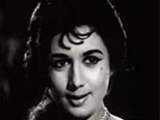14. Rama meets Guha
The residents of Ayodhya followed Rama till they all reached the banks of the river Thamasa before night fall and they spent the night there. Valmiki says that when Rama left Ayodhya the sun disappeared, meaning that it became dark before the sunset and the sky was without stars and planets as though the whole world was grieving for Rama. Kamban develops it further by saying kadhiravan attham pukkanan, kaan pugaakkaaNgilEn enru,' that is, the sun set as though saying" I cannot bear to see Rama going to forest."
When the people following Rama slept due to exhaustion of walking and their sorrow, Rama woke up before them and told Sumanthra to get ready the chariot and they traveled along the Thamasa river and Rama got down with Lashman and Seetha and told Sumanthra to turn the chariot and drive towards Ayodhya so that the people would think that they have gone back and would return to the city. Then sumanthra could come back to Rama through some other route. Sumanthr did likewise and the people waking up saw the tracks of the chariot and followed it but were disappointed on not seeing it further and returned to Ayodhya stricken with enormous grief.
Rama was traveling through the villages on the outsirts of the city and crossed the border of the country of Kosala and the people from the villages were lamenting their fate. Thus Rama reached the banks of Ganga..
Guha, a close friend of Rama and the leader of the hunters was ruling the place nearGanga and he hastened to see Rama with all his retinue. The first instance which shows Rama as the saviour of all, may it be man, bird and beast, irrespective of birth. is seen in this episode. Rama welcomed Guha with open arms, treating him like a brother, says Valmiki, and this was developed further by Kamban which we shall see later in the episode.
Guha was grieved over the fact that Rama whom he had seen earlier as a prince decked with jewels and with rich attire had come there now as a hermit. He told Rama that it was his previous merit that Rama had come to that place and offered his kingdom to Rama saying that he and his dependents would be his servants. He said that he had arranged for rich food and accommodation so that Rama could live there happily.
Rama showed his appreciation for the hospitality and enquired about the welfare of Guha and his people. But Rama refused his offer of kingdom and other offerings of food etc. saying that, having renounced his own kingdom and opting to live as a hermit in the forest he could not accept these but should eat only what the hermits would and should sleep on the floor. However he asked Guha to supply grass for the horses of the chariot. Then Guha ordered his men to do so.
Rama consumed only water as his food and lay down on the floor with Seetha for the night. Lakshmana washed the feet of Rama as a servant should do to his master at bedtime and came to the place under the tree where Guha was.The two of them with Sumanthra spent the night talking about what had happened and Guha was surprised to see Lakshmana keeping awake watching over Rama and asked him to sleep in a bed which was prepared for him, saying that since he was a prince it would have been difficult for him to keep awake whereas they were quite used to it being hunters and they would look after Rama and Seetha. Lakshmana replied that he could not bear to see Rama and Seetha sleeping uncomfortably on the floor and that was why he could not sleep. He was also worried that his father and mother of Rrama and all those who loved Rama may not survive till Rama returned to Ayodhya and expressed his concern that they may never see their father or do the obsequies on his death. Valmiki says that Lakshmana was very much distressed and shed tears like an elephant afflicted by fever.
Kamban differs from Valmiki in this as Rama sends Sumanthra back while the people were sleeping and the three of them walked on foot The episode of Guha comes only later in Kambaramayana.
The next morning Rama told Guha to get the boat to cross the river Ganga and when he did so, bade goodbye to Sumanthra. Rama told him that he had obeyed the command of the king and brought them till the banks of the river and it was only proper that he should return to Ayodhya. What was implied is that according to the custom that one could accompany those who are going away only till the waterfront to be crossed. Hence Rama meant that Sumanthra had fulfilled his duty.
To Sumanthra who shed profuse tears, Rama said that he should go back and comfort Dasaratha and others. Rama told Sumanthra to tell Dasaratha that they were not regretting leaving Ayodhya and were very happy in the forest and that Dasartha would have the joy of seeing them after 14 years. He also sent their obeisance to Kousalya. Rama also told Sumanthra to tell Dasaratha to call back Bharatha from Kekaya and crown him soon so that Dasaratha could forget the grief about the travails they were undergoing by living in the forest, in the company of Bharatha. Here one could perhaps see a veiled criticism on Dasaratha sending them to forest listening to the words of Kaikeyi. Rama's words impliesd that Dasartha seeing the wishes of Kaikeyi fulfilled by crowning Bharatha, which would make her happy, may even forget Rama and revel in the happiness of his wife.
Rama also sent his message to Bharatha that he should treat Kousalya the same manner as he would regard his mother Kaikeyi and rule the kingdom according to dharma.
Sumanthra on hearing the words of Rama was very unhappy and told him that Dasaaratha, Kousalya and others and the people on seeing the empty chariot would not be able to bear the fact that Rama had gone to forest and he could not tell a lie to them that he had left Rama in the house of his uncle, meaning , the forest is not as comfortable as the house of an uncle. Moreover the horses he said would not carry the chariot without Rama,. Hence he begged Rama to allow him to stay in the forest and take them back after fourteen years. Sumanthra shows that he was a devotee more than the counselor and charioteer by saying that he will be doing service to Rama more than which he did not desire Ayodhya nor even the heaven ayodhyaam dhevalokam vaa sarvaThaa prajahaamyaham,' like the azvar who ssid, indhiralokam aaLum acchuvai perineum vEndEn arangamaanagaruLaanE,' meaning that he would not desire even ruling the heaven more than remaining on earth and sing the glory of the Lord Ranganatha.
Rama pacified him saying that Kaikeyi would get reassurance that Rama had actually gone to forest only when she saw the chariot returning empty and would not suspect that Dasaratha was deceiving her. So in order to make Dasaratha true to his word Suamnthra had to return. Then Rama sent back Sumanthra and told Guha that they would cross the river in the boat brought by him and bade him goodbye.
Seetha and Lakshmana also sent mesaages to Dasaratha and others which Sumanthra conveys to the king later in Valmikiramayana. In Kamban it is slightly different.















comment:
p_commentcount